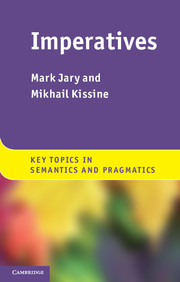Book contents
- Frontmatter
- Contents
- Acknowledgements
- List of abbreviations and notation
- Introduction
- Part I The data
- Part II The theories
- 4 The imperative is directive force
- 5 Declarative-like semantics for imperatives
- 6 The imperative as a distinct semantic type
- An opinionated conclusion
- Appendix A Possible worlds and semantics
- Appendix B Modality in possible-word semantics
- Appendix C Stalnaker’s common-ground model of assertion
- Glossary
- References
- Index
5 - Declarative-like semantics for imperatives
Published online by Cambridge University Press: 05 July 2014
- Frontmatter
- Contents
- Acknowledgements
- List of abbreviations and notation
- Introduction
- Part I The data
- Part II The theories
- 4 The imperative is directive force
- 5 Declarative-like semantics for imperatives
- 6 The imperative as a distinct semantic type
- An opinionated conclusion
- Appendix A Possible worlds and semantics
- Appendix B Modality in possible-word semantics
- Appendix C Stalnaker’s common-ground model of assertion
- Glossary
- References
- Index
Summary
The history of twentieth-century philosophy of language and linguistics was marked by the advent of truth-conditional semantics. Modelling the meaning of declarative sentences (and their utterances) in terms of their truth conditions has proved a powerful tool with which to predict their meaning on the basis of structural relations between their parts. Given the success of such methods – which continue to undergo constant sophistication and improvement – it is understandable that there is a great temptation to account for non-declarative sentences in the same way. And yet imperatives and other non-declaratives are a recalcitrant problem for truth-conditional accounts of linguistic meaning, for how can sentences that cannot be true or false be accommodated by such a theory? Those seeking to extend the truth-conditional-semantic programme to cover imperatives have taken two routes. Some have argued that imperatives are in fact declaratives with special features that makes truth judgements infelicitous: imperatives do have truth conditions, the argument goes, but – for various reasons – it is odd to describe them as true or false. Others have argued that the notion of truth should be seen as merely one way in which a sentence or utterance can be satisfied, or fulfilled. Hence, they go on to argue, we should analyse imperatives in terms of the type of fulfilment conditions that apply in their case: compliance conditions. As it turns out that compliance conditions are specified in terms of the truth conditions of a declarative sentence, then imperatives end up being analysed by reference to the truth conditions of the declarative sentence that specifies their compliance conditions. This type of approach is examined in the second section of this chapter. The first is devoted to theories that take the first route by seeking to provide a truth-conditional analysis of the imperative.
The ‘performative hypothesis’ and Davidson’s paratactic account
We will start the discussion of truth-conditional accounts of the imperative by what is known as the performative hypothesis. This view dates back to the 1970s, and, as far as we know, is unanimously rejected today. However, it is worth discussing, if only briefly, because the motivations to reduce non-declaratives to declaratives underlying it – and the problems these raise – extend to more contemporary theories, to be examined later in this section.
- Type
- Chapter
- Information
- Imperatives , pp. 212 - 257Publisher: Cambridge University PressPrint publication year: 2014

